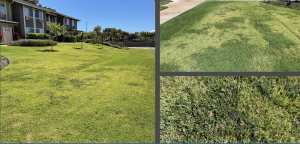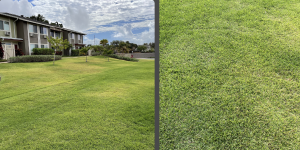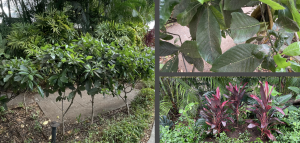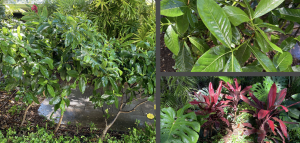Reef-Safe Landscaping Shows Promise for Maui Properties
After three months of switching to a non-toxic, reef-friendly soil amendment, local properties saw promising improvements in the health of their plants and landscaping. The toxic chemicals in widely used conventional products often end up in the ocean through runoff and groundwater, harming reefs and marine life. MNMRC’s pilot reef-friendly landscaping program aimed to address this major source of pollution at its root.

Prior to using reef-safe soil, a test plot shows significant patches of lawn weeds and uneven coloring. Credit: MNMRC Pilot Report

After four months of using reef-safe soil, the test plot shows a significant decrease in lawn weeds and has more even coloring. Credit: MNMRC Pilot Report
In 2023, MNMRC developed a 10-course curriculum taught by industry experts to educate property owners on the practices and benefits of alternative landscaping methods. In addition to the curriculum, participants in the pilot program were offered access to SoilThrive, a locally made, non-toxic, biological soil amendment or “compost tea”, which was supplied for their test plot, free of charge. The compost tea worked as both a foliar feed, a technique of applying liquid fertilizer directly to plant leaves, and as a solution for preventing pests and disease.
From October 2023 to December 2023, the compost tea was applied to test plots at developments, resorts, and farms across the island. At the end of the pilot period, every property reported improvements in an array of categories including pest populations, weed patches, plant growth, and disease resistance.

Plants prior to use of compost tea show heavy white fly cover. Credit: MNMRC Pilot Report

Plants after use of compost tea show dramatic reduction in white flies and increase in new growth. Credit: MNMRC Pilot Report
At the time of writing, Kahoma Village has signed a contract to utilize compost tea to treat the Whitefly on their Hibiscus. Hale Roayle, Mahina Surf, Napili Shores, Ledcor Group, Kamalani Condos, and Legend Farms are in discussions for more reef-friendly landscaping in 2024.



No Comments
Sorry, the comment form is closed at this time.